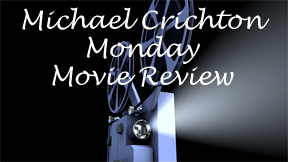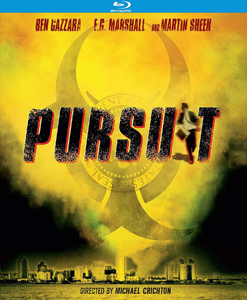Michael Crichton started modestly as an author with the John Lange books, and he likewise starts slow as a director with “Pursuit” (1972). Although it’s based on the Lange finale “Binary” from earlier that year, this 84-minute ABC TV movie is flat and boring. The book has forward-moving energy and thoughtfulness about the spy state and domestic terrorism.
Lost in translation
And yet the teleplay by Robert Dozier is faithful. And he wisely adds visual life when he can. Rather than reading his psych report (stolen by terrorist Wright) like in the book, Agent Graves (a wry Ben Gazzara) hears about it from his psychiatrist at an outdoor lunch.
It’s the same “lost in translation” quirk that struck “The Andromeda Strain.” An engrossing book becomes a boring movie, despite being faithful. The book can overcome weaknesses the film can’t.

“Pursuit” (1972)
Director: Michael Crichton
Writers: Robert Dozier (teleplay), Michael Crichton (novel “Binary”)
Stars: Ben Gazzara, E.G. Marshall, William Windom
In “Pursuit,” I didn’t care that the San Diego political convention is being threatened by Wright (an all-business E.G. Marshall). Not a single San Diego citizen is a character.
Compare this to Season 1 of “24” when a political gathering is threatened. Like or dislike candidate Palmer, he’s a real person, as are his family members.
I think “Pursuit” uses ABC news B-roll from an actual convention, which is a good way to save on production costs. Admittedly, Crichton’s direction is so dry that it matches up.
Slow, methodical pursuit
Most of “Pursuit” consists of Graves and driver Lewis (Jim McMullan) following Wright as the terrorist picks up supplies for his deadly device. Same as in the book, but less interesting in the film medium. (Admittedly, part of my boredom is from already knowing the story, which I had recently read. But only part.)
The ticking clock, occasionally shown at the bottom of the screen, is a forced time-lock device. As with the novel, we don’t know for sure that Wright plans to unleash the weapon to coincide with the president’s speech. But in the book I accept an omniscient narrator who knows the clock means something; in the film, I don’t.
“24” should have the same problem – there’s no reason the events should cover exactly 24 hours – but I buy into it there because of the unusual “real-time” gimmick. In “Pursuit,” 15 hours (changed from “Binary’s” 12) is covered in 74 minutes.
But there must be a couple instances of thrilling action, right? Well, Crichton tries, but they come off as comical. First, Wright hilariously escapes custody by getting up and running away, and he inexplicably has access to the keys of a police car.

Later, Lewis must run down apartment building stairs, grab a bomb-sniffer from his car trunk and run back up the stairs as time runs short. Lewis runs past several cops who stare at him. Could he have radioed one of them to bring up the device? Maybe the trunk was locked. But he could’ve done something to trim the time, like throwing the keys down.
Worrywarts
Those who prefer the visual medium to the written might enjoy “Pursuit” for a major reason I embraced “Binary.” We see a precursor to “24’s” formula with the ticking clock as terrorists scheme and agents pursue. And they might enjoy familiar faces like William Windom and a young Martin Sheen.
But a notable thing is missing in the adaptation. In “Binary,” Crichton soberly outlines the policy flaw of the U.S. Army moving chemical weapons with scant protection, and proposes a detailed solution.
In “Pursuit,” Dozier – perhaps seeking a theme that was heretofore lacking – ends the film with a statement (from a smart chemical expert played by Joseph Wiseman) that we should “worry” about domestic terrorism. The word “worry” ends the story and then is repeated after the credits.
This is quite a contrast from Crichton’s general view that we should understand the problem, seek solutions and maintain a level head. It was most crisply (and controversially) stated in “State of Fear,” where he posits that climate change should rank much lower on humanity’s worry list than the top-10 spot it occupies.
Quite possibly, the “worry” is more Dozier’s contribution than Crichton’s. And with “Pursuit,” the director at least proved his ability to deliver a film on time and on budget — a big reason why he was hired to helm seven films. In at least a few later cases, we should be glad he was.

